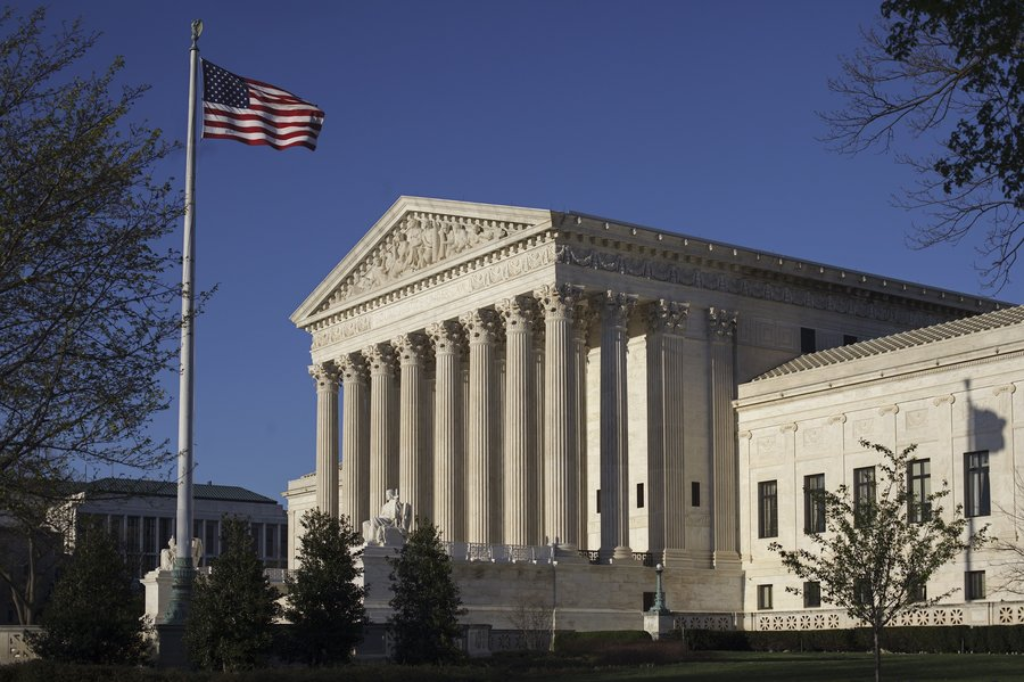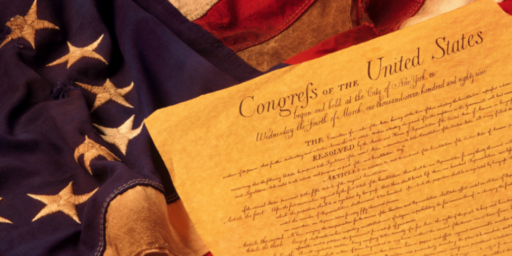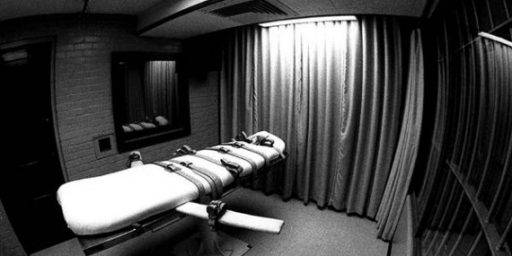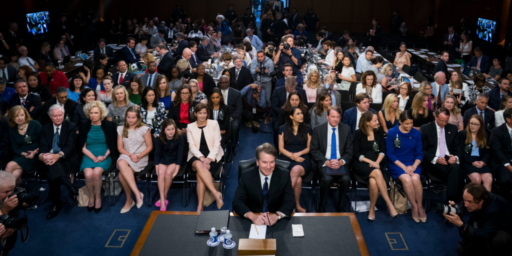SCOTUS: States Can’t Ban Clergy from Death Chamber
A rather odd non-ruling during the non-session from America's highest court.

Alabama’s inhumane execution practices have repeatedly been the subject of Supreme Court decisions. The latest one, though, raises more questions than it answers.
Adam Liptak for NYT (“Supreme Court Rebuffs Alabama’s Effort to Bar Pastor From Execution Chamber“):
The Supreme Court late Thursday night let stand a ruling that halted the execution of an Alabama inmate unless the state allowed his pastor to be present in the death chamber.
The inmate, Willie B. Smith III, a Christian, sought to have his pastor, Robert Paul Wiley Jr., provide him with spiritual guidance and comfort, his lawyers wrote, “including by holding his hand, praying with him in his final moments and easing the transition between the worlds of the living and the dead.”
Prison officials denied the request under a recently revised policy that bars from the execution chamber spiritual advisers of all faiths. A federal appeals court then ruled that the execution could not proceed unless Pastor Wiley was allowed to be present.
The Supreme Court’s order said only that it would not vacate the injunction entered by the appeals court requiring the pastor’s presence. It gave no reasons.
Setting aside the inherent problems with capital punishment, which are not at issue here, it’s not obvious to me on what basis a condemned man is entitled to have a spiritual advisor hold his hand while he’s actually being put to death. To the extent that he’s lost his right to continue living because his crimes against society are so horrific, why is he entitled to this particular accommodation?
Why not his parents or another loved one? An emotional support animal? His recreational drug of choice?
The order did not specify how every justice had voted. But Justice Amy Coney Barrett joined the court’s three-member liberal wing — made up of Justices Stephen G. Breyer, Sonia Sotomayor and Elena Kagan — to let the appeals court’s ruling stand.
“Alabama has not carried its burden of showing that the exclusion of all clergy members from the execution chamber is necessary to ensure prison security,” Justice Kagan wrote for those four justices in a concurring opinion. “So the state cannot now execute Smith without his pastor present, to ease what Smith calls the ‘transition between the worlds of the living and the dead.'”
Where does this right inhere? Or where does the state get the duty to appease the superstitions of its condemned in this particular manner?
Justice Clarence Thomas wrote that he would have lifted the injunction but gave no reasons.
In a dissent, Justice Brett M. Kavanaugh, joined by Chief Justice John G. Roberts Jr., wrote that he, too, would have lifted the injunction.
“Because the state’s policy is nondiscriminatory and, in my view, serves the state’s compelling interests in ensuring the safety, security and solemnity of the execution room,” he wrote, “I would have granted the state’s application to vacate the injunction.”
That seems the obvious ruling here. Indeed, in the past, Alabama provided only for Christian pastors. The Court, almost exactly two years ago, said that was just fine. And that was a real case, heard during the real session, with real opinions. Since then, Ruth Bader Ginsburg, was joined Kagan’s dissent in that case, has died, replaced by Barrett—who voted in the same direction.
It seemed rather obvious at the time that the previous practice violated the Establishment Clause of the First Amendment. But the Court allowed it, both on Alabama’s dubious claims of security concerns (the state-employed Christian pastors were vetted and trained in the execution process) and because the condemned had filed for delay after delay and the majority cried Enough.
But, now, Alabama has adopted a religiously neutral policy and suddenly it has a duty to accede to demands for spiritual support at the moment of execution?
Justice Kavanaugh added some practical advice.
“States that want to avoid months or years of litigation delays,” he wrote, “should figure out a way to allow spiritual advisers into the execution room, as other states and the federal government have done. Doing so not only would satisfy inmates’ requests, but also would avoid still further delays and bring long overdue closure for victims’ families.”
Would it, though? Wouldn’t inmates’ attorneys simply come up with other excuses for delay?
Indeed, shortly after the 2019 Alabama case, the Court ruled the other way in a related Texas case with slightly different facts.
About two months later, the court confronted a similar case from Texas and came to a different conclusion, staying the execution of a Buddhist inmate whose request that his spiritual adviser be present in the execution chamber had been denied.
In a brief, unsigned order, the court said that Texas could not execute the inmate, Patrick H. Murphy, “unless the state permits Murphy’s Buddhist spiritual adviser or another Buddhist reverend of the state’s choosing to accompany Murphy in the execution chamber during the execution.”
In a concurring opinion, Justice Kavanaugh wrote that the state’s policy of allowing only Christian and Muslim chaplains to attend executions amounted to unconstitutional religious discrimination. “The government may not discriminate against religion generally or against particular religious denominations,” he wrote.
Justice Kavanaugh wrote that states could exclude advisers of all denominations from the execution chamber, but may not allow only some to be present.
In response, Alabama changed its policy, now barring all spiritual advisers from the death chamber. Mr. Smith challenged that policy under a federal law that requires states to meet a demanding standard for actions that place a burden on religious rights.
Again, where does a “right” to have a “spiritual advisor” at the moment of execution inhere?
This very much smacks of making it up as we go along.






I think capital punishment is simply wrong for a variety of reasons (one of which is the possibility of wrongful conviction — and I’m amazed that small gov’t conservatives are willing to give the gov’t the single biggest power of all, to take away a citizen’s life, makes me doubt their belief in small gov’t is sincere).
But if you’re going to do it, why not allow the condemned a spiritual advisor? Is it a safety issue? A cost issue? Or is it just being bloody minded (ie maximizing the condemned suffering before execution)?
Or a full choir singing evangelical hymns. A very crowded room.
What an oddly spelled word: hymns. It is as if they had no idea what to call it, picked some random letters and threw them together.
And sometimes, “y”, my friends. Sometimes “y”.
Solemnity? How does the inclusion of a religious or spiritual advisor subtract from the states’s interest in solemnity? Whatever that means.
Somehow it feels like the liberals, Barret and another were trolling the rest of the court.
@Northerner: It’s easier to make a case against a practice that goes back to the beginning of law on a libertarian than a conservative basis. There is, though, a pretty strong conservative case to be made that the state is likely to eff it up and therefore shouldn’t have that power.
@Liberal Capitalist: English is a weird language because it simply imports words from so many different other languages.
@Scott: Depends on the spiritual advisor, I guess.
@Northerner: “Bloody Minded” is the entire point of capital punishment. It’s proven not to be a deterrent to others, and it’s certainly not a deterrent to the person they kill. It’s expensive and keeps the case alive for years, if not decades, re-victimizing the victims and their families the entire time.
Thus, any action that furthers the anguish of the convict, seems to be in line with the intent of the punishment.
My takeaway is this: Above all, Alabama wanted to poke a finger in the eye of non-Christians. If I understand correctly, they originally only allowed Christian ministers (did they allow Catholic Priests? A lot of Evangelicals don’t think Catholics are Christians). When it looked like they might have to allow another religion, they said, “No clergy at all.” Why? Because they are not going to recognize another religion. This is a Christian Nation! And they are willing to spend significant time and money on it.
And these are the people who now steer the Republican Party
@MarkedMan:
“A lot of Evangelicals don’t think Catholics are Christians.”
This reminds me of an interesting side note in the George Zimmerman case. He was being interrogated by a detective and noticed she was wearing a necklace with a cross on it. He asked her if she was Catholic, and she replied, “No, I’m a Christian.”
What does she think Catholics are, Druids? And what exactly is meant by “Christian”? Don’t Christian people affiliate with one denomination or another? Methodist? Lutheran? Episcopalian? Presbyterian? Baptist? What?
As an atheist I can’t help but ask, where is the harm in allowing this?
@MarkedMan:
No, not really. They only allowed their on-staff chaplains to participate, citing training and security requirements. The appellant asked for a private sector Muslim imam and was denied.
@OzarkHillbilly:
None that I can see. But where’s the requirement? It’s not up to the courts to make policy but to ensure that elected policymakers don’t violate the Constitution or applicable statutes.
@CSK: I grew up in a well integrated neighborhood on the South Side of Chicago. I went to school with Irish Catholics, Polish Catholics and Italian Catholics. (In fairness, it was a Catholic School.) I was astounded when I became friends with a couple of Evangelicals and at one point they started telling me about Catholics. We weren’t allowed to read the Bible. We had to do whatever the priest told us. Etc. They were so sure, and so wrong and I let them go on and on, and gradually realized – Evangelicals spend A LOT of time talking about other religions. They seem obsessed with all the ways everyone else is wrong and hypocritical. Spending twelve years in Catholic schools, aside from when religion showed up in our standard history textbooks, the only time I remember a discussion of other religions was a list we got ranking other churches as most similar to the Catholic Mass in case we ever found ourselves in a town without a Catholic Church on Sunday. There wasn’t even a comment on how they were different.
@James Joyner:
Ah. So they just wouldn’t hire or train a non-Christian. Got it.
I remember when I lived in Georgia a work colleague ranting on about a court ruling that said they had to take down some cross or similar Christian idol. I happened to have read about the ruling and I pointed out that what it actually said was that if they were going to display stuff from one religion they had to accommodate others. She looked at me like I was a total idiot. “As if we would put up false idols!” To her, sharing the space was the same as an order to take it down.
Yes, why not?
Is the condemned individual going to be any less legally murdered if any or all of that is allowed?
@MarkedMan:
How interesting. I assume the two churches most similar to the Roman Catholic church would be the Lutheran and Episcopalian.
I believe Orthodox Lutherans regard themselves as the true Catholics.
@Liberal Capitalist: The “n” is silent in “hymn”, but not silent in “hymnal”. Could be the result of an un-intended contraction, like “damn” from “damnable”.
Just further unintended consequences of the commission that created the King James Bible.
@CSK: I honestly don’t remember what was on the list. It was literally almost half a century ago. But my gut tells me Lutheran’s are high up there, and the various Orthodox probably get on it too. I vaguely remember we weren’t supposed to take communion though. Do Lutherans even have communion?
@MarkedMan: I don’t know this firsthand, but it is my understanding that Charismatic Catholics follow practices including a blend of Evangelical and pre-Second Vatican (1963, change from Latin to Vernacular Mass) dogmas.
Greek/Russian/Bulgarian/Eastern Orthodox Christians I have known all consider themselves Catholics, but the term Catholic has been appropriated in the Western World to specifically mean pertaining to the Church of Rome (lest we forget, the Pope is technically just the Bishop of Rome).
From the Greek, catholic loosely translated to “universal”, so in a nutshell it is all an influence operation to put one sect above all others.
It’s a bit like the capital city of South Korea. The city has had several names, most recently “Hanseong” but the word “Seoul” means “Capital City”. North Koreans refer to Pyongyang as Seoul, and through history a number of cities in Korea have been called Seoul. Fun fact, this was a point of contention at the end of the Korean War, but the South Korean influence operation won out in the end, making their capital Seoul on the world stage.
@MarkedMan: This will get deep into theology but the reason Roman Catholics shouldn’t take communion from other denominations is that they believe in transubstantiation which is the actual transformation of the bread and wine into the blood and body of Christ. Other denominations, such as Lutherans and Episcopalians believe in consubstantiation in which the bread and wine are not transformed but imbued with the real presence of Christ.
@Owen Somers: I can tell you from personal experience that Catholics run the gamut from “indistinguishable from rabid evangelicals” to “Crazy self-flogging fanatics” to “People who know where the church is” to “People who aren’t sure if there is a Catholic Church nearby”. Those last two categories cover like 97%.
@MarkedMan: like they say, when you’re used to special treatment, equality feels like oppression.
@Scott:
Out of curiosity, has anyone taken the appropriate samples and looked for extraneous human DNA from people taking Catholic communion?
@Kathy: Oh yee of little faith! 😉
Wow, that’s a terrible NYT article. It states the court “gave no reasons” despite the fact that Kagan’s opinion clearly gives the reasons in the first paragraph:
The article quotes from the opinion, but somehow neglects the relevant part and asserts the court “gave no reasons.”
There is pretty clearly a free exercise argument here and also the federal law that guarantees the religious rights of prisoners. The opinion itself makes that very clear.
More from Kagan’s opinion:
@MarkedMan:
Lutherans do have communion: body and blood of Christ. I wasn’t raised in any religion, so what I know about them is just from reading.
Yesterday cannibalism was a topic. Today we’re discussing eating bodies and drinking blood. Slippery slope folks, slippery slope.
@Liberal Capitalist: “What an oddly spelled word: hymns. It is as if they had no idea what to call it, picked some random letters and threw them together.”
It comes from the Greek “hymnos,” which doesn’t look strange at all. It’s the cutting off of the last two letters that makes the m-n seem so weird.
Considering how expansive the definition of “religious freedom” has become according to these people, this ought to be a simple decision.
@Owen:
Only if “none” equals “little.”
I once discussed such things online with a Catholic priest. One time when the subject of “little faith” came up, I asked him “Do you find my lack of faith disturbing?” But he didn’t get the reference.
@CSK: Please don’t take this wrongly, but only a person who isn’t a Christian (such as you have noted about yourself) would ask that question. ANY Christian would know better.
@MarkedMan: Yes. But differing from SOME Catholic practice, the parishioners get both bread and wine. Another difference is that not all Lutheran churches do mass for every service, so some services don’t have communion. Beyond that, the practice of visitors to church needing to be invited to stay for communion by a member was discontinued sometime after my pre-teen years and most synods of Lutherans practice open communion from what I understand.
@Just nutha ignint cracker: I probably should have said “Protestant” or “Evangelical” rather than “Christian” in my previous comment, but since everybody knows that only [fill in your denomination here]s are REALLY Christians…
And while I’m here and being pedantic, I’ll note that the reason that the “n” is silent in “hymn” but not in “hymnody” is because it takes a vowel to pronounce an “n.” If it were spelled “hymne,” it would be pronounced “himnuh.”
@Just nutha ignint cracker: @Just nutha ignint cracker:
No offense taken. I suspect you’re being delightfully snide in your comments about REAL Christians anyway.
As Queen Elizabeth I characterized it: “A dispute about trifles.”
I think it’s tattooed on one’s soul.
James, this topic has been a fascinating and interesting trip (well, to me anyway, but then again, I am a F/T sociopathic luddite and P/T lurker here), I can’t help but wonder what caught your eye on this topic long enough to give us about 1,000 words to start the ball rolling?
@Andy:
The problem is that these emergency rulings tend not to have a standard majority opinion. Kagan issued a Concurring opinion, joined by Breyer, Sotomayor, and Barrett, which agreed with the result but doesn’t establish a precedential rationale.
@flat earth luddite:
It combines three topics of interest: capital punishment, religious liberty, and my erstwhile home state of Alabama.
@Andy:
Could you say a little more about that law? It seems to me that James’s position is predicated on there being no law that can be construed as establishing a right to have a specific religious accommodation at an execution. If that’s not right — if there is such a law, or a reasonable case can be made that an existing law should be interpreted that way — then I think James’s argument implodes.
Without such a law, James’s argument seems pretty sound to me; there’s an obvious slippery slope that others have pointed out above, and you really don’t want the government to be in the business of determining which specific requests have genuine spiritual or pastoral merit.
@James Joyner: Thanks for the response. It seemed a curious choice, but I think I get it now. It certainly started the ball rolling in interesting directions in the pachinko machine, didn’t it?
@James Joyner: Well dang me for an idiot. I just reread the top post and realized I confused it with a different case. I didn’t realize this was a Christian about to get killed. I withdraw my comment above, and have a much better understanding of James’ perspective.
@James Joyner:
I’m not sure what the alternative is for death penalty injunctions where a quick decision is critical.
@DrDaveT:
Kagan goes into detail in opinion linked in my original comment but here is crux of the law courtesy of FindLaw:
Basically, Kagan in her opinion argues that Alabama’s reasons for denying the religious request don’t meet that standard.
@Scott:
RE:
It’s the opening the door to whomever or whatever the inmate decides is their spiritual adviser.
Corrections doesn’t want the door flung wide open to whoever or whatever the inmate designates as their spiritual adviser.
https://www.mercurynews.com/wp-content/uploads/2021/02/AP21036073333264.jpg?w=525
Anybody can call themselves a pastor, priest, or shaman. Anyone.
And the problem is? Again, as an atheist, where is the harm? Who the fuck cares? If it eases their passing, where is the harm?
I’m an atheist. I think Christians are deluded. Same for Muslims, Buddhists, Hindus, Sikhs, Jews, etc etc. But if it eases their passing, who am I to deny them that?
@OzarkHillbilly:
Only one minor issue, really I have nothing against this in theory. I actually have been against the DP ever since they refused to even consider it for OJ because he was rich enough to afford top-drawer lawyers. That opinion has since been strongly reinforced by the DNA evidence showing a lot of bad verdicts too.
Anywho, the reason it’s being fought is Corrections can anticipate someone deliberately selecting the looniest person they can find. In the chamber? That could be a problem. They got a point there.
@James Joyner: 8th amendment, spiritual advise during execution has a long tradition, and denying it would have been considered cruel and unusual by the founders.